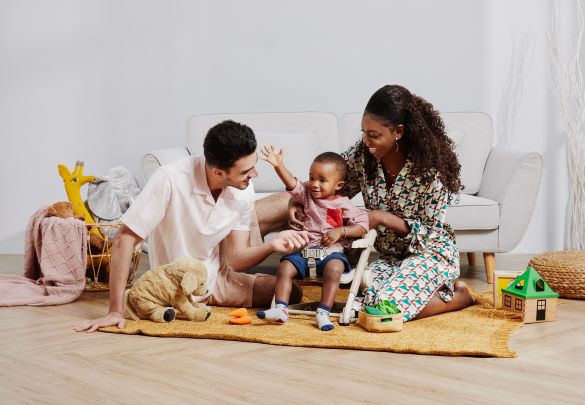As parents, it's essential to start teaching your kids about sex early on to lay a healthy foundation for their future understanding of sexuality. However, discussing sex with young children can be challenging and uncomfortable for many parents.
The topic of sex can be daunting, but it's crucial to educate your children about it in a way that's age-appropriate, honest, and safe. If you're reading this, you're probably planning to have the 'big talk' with your child. If you don't know where to start, we got you!
Why should you teach children about sex?
As uncomfortable as it may be for many parents, teaching children about sex is an important part of parenting. Children are naturally curious, and without proper guidance, they may turn to unreliable sources for information. By teaching children about sex, parents can ensure that their kids receive accurate information that is age-appropriate and safe.
Additionally, teaching children about sex can help them develop a healthy understanding of their bodies, relationships, and boundaries. Therefore, parents and caregivers should consider it their responsibility to teach children about sex in an age-appropriate and safe manner.
Tips and Tricks to Teach Your Child about Sex
Here are some tips and tricks to teach your child about sex and sexuality.
Educate Yourself
Before thinking about how to teach your kid, think about what to teach. First, do your research and practice with an adult. It's normal to feel embarrassed to talk about something so personal. So find out what you're comfortable with. Choose the easier topics first and start from there. If you still feel uneasy about some things, delay till you're ready.
If you're asked a question that you don't know the answer to, admit it. Don't lie or refuse to talk. You don't have to be an expert. Just learn about it and teach your kids later.
Open a Conversation
Your child may ask you, "how are babies made?". Before answering, ask them what they think. Realize their level of curiosity and understanding. Try to understand what they want to know. Let them know that it's not wrong to ask about it.
But some kids are too shy to ask. So it's in your hands to start the conversation. Choose a proper time and place for that. Some kids might feel comfortable at the dinner table. It might be uncomfortable to have eye contact, so try it in the car while traveling.
Make sure that they don't feel confronted or pressured. Be open-minded about the questions they're asking. Incorporate everyday things into the conversation. Whether it's your pregnant neighbor or some newborn kittens, use it to bring up the subject!
Be Simple but Factual
There are many reasons why you should teach your kids about sex. But there are only a few facts that your child can absorb. One major tip is to use simple language. Describe processes like fertilization in simple words. Like, an egg from a woman and a sperm from a man coming together to make a baby. See! Not so hard, right?
Always give accurate information. Make sure not to oversimplify it. Using slang is fine, but use the right terms for the majority.
There's No 'Big Talk'!
Shocking right? But it's true. The conversation about sex and sexuality shouldn't be a one-time thing. Teaching them such huge concepts without the basics is useless. You can't just drop the bomb at an older age.
But there's good news too! Because there's no ultimatum. It's an ongoing process that should be carefully woven into their daily life. Like building a house, you have to add layer by layer. Kids can be forgetful. So get ready to repeat yourself a few times. Remind them frequently about important topics. They'll learn at their own speed.
How should you teach your children about sex?
Here are some tips for how you should teach your children about sex and books to refer to, which would be segregated for different age categories, including the do's and don'ts.
0-2 Years Old
At this age focus on teaching about body parts at this age. Use everyday activities like bath time. Tell your kid about body parts and their functions. Explain how bodies are different yet similar at the same time. Normalize talking about their private parts. This way, they can view every part as equal without being embarrassed.
3-5 Years Old
Your child can read at this point. Incorporate books into the learning process. You can refer to these books.
- 'Everyone's Got a Bottom' by Tess Rowley
- 'Hair in Funny Places' by Babette Cole
- 'What Makes a Baby' by Cory Silverberg.
Your child meets new people at this stage. So knowing about consent, boundaries, and sexual assault is vital. Even if it's a hug, they have the ability to refuse.
If they touch their private parts in public, don't get angry. Instead, explain why it's inappropriate. They'll eventually grow out of it. You might catch them touching other kids inappropriately while playing with them. If so, teach them later that it's not okay.
You can set your boundaries too, like when they shouldn't enter a room or where they shouldn't touch you.
6-8 Years Old
By now, they're more mature. So you can talk about sexual intercourse as a normal thing between adults. Use books like: 'Mummy Laid an Egg' by Babette Cole and 'Sex is a Funny Word' by Cory Silverberg to understand how to teach them properly.
They might get curious about different families and relationships they see at school. That's why sex education from a parent is important. No need to elaborate on things like sexual orientation. But let kids know about their existence.
At this age, online safety is very important. So make sure you're their number one source of information. Even if they don't use the Internet unsupervised, let them know about the dangers of it.
Lastly, talk to them about puberty. It's better to know before experiencing it. It's a time of physical and mental change.
Final words
By establishing an open and comfortable environment for discussing sexuality, parents can help their children develop healthy relationships. Remember to focus on consent and safe sex practices and to start early and continue the conversation as your children grow. By following these methods of teaching your kids about sex, you can ensure that your children can stay safe and healthy throughout their lives.



